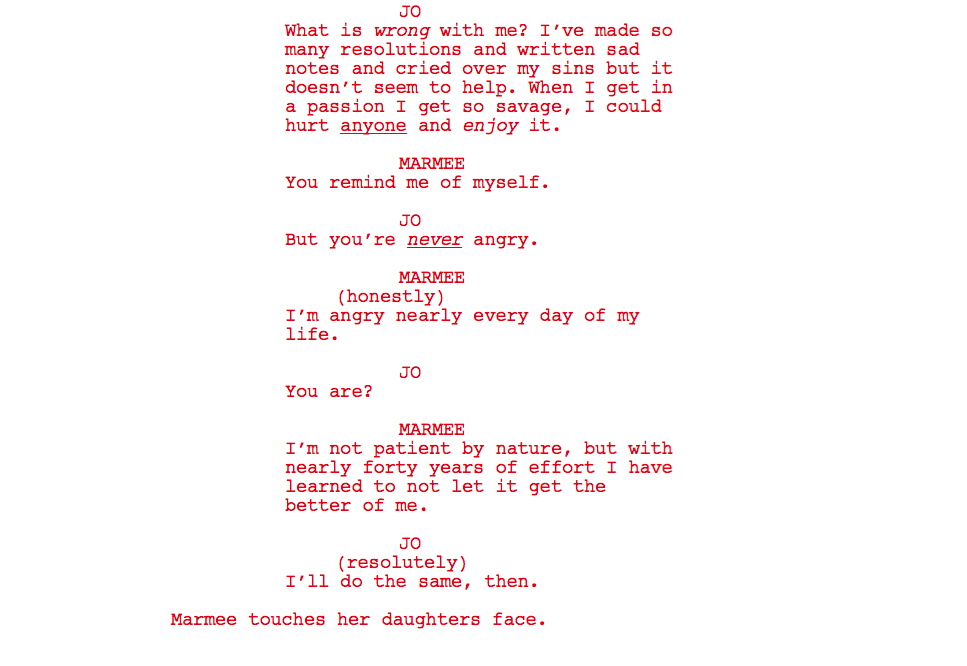little women & artistry
I’ve been fortunate enough to know many artists in my life. I found to be on differing levels of talent and self-awareness, some of them rarely doing what they’re good at, while others stayed devoted to it like religion. Regardless, I’ve respected each one of them for their level of passion and dedication – the bare minimum requirements to be an artist and yet difficult to maintain. Especially when life brings the tide higher and higher, threatening to wash away the time you’ve set aside for your art.
In the newest iteration of Little Women, directed by Greta Gerwig, she hones in on what it means to be an artist, specifically a female artist, though I believe a lot of the lessons can apply to a male audience as well. Of course, Gerwig cannot take all the credit when Louisa May Alcott’s source material is so rich with wisdom pulled from her own life as an impoverished writer. Perhaps because I was younger and further from my devotion to my art, when I read the book in high school, I didn’t gather as many ideas as I did watching the movie at this stage of my life.
From my multiple viewings of the film and readings of the screenplay, I have gathered from Gerwig’s Little Women that to be an artist, on top of the foundation of passion and devotion, you MUST have patience along with talent. Jo March embodies these characteristics and throughout the movie we see what it means to apply them to become an artist.
Jo shows dedication right from the beginning of the story. We see how much she wants to write from the ink stains on her hands, to staying up late, flexing her cramped hands in the dimness of the candlelight. Yet at first, her talent seems focused on a desire to survive. She writes to make money to send to her family, while her sister Beth is bedridden from sickness, her sister Amy is traveling and hoping to marry rich, and her sister Meg who has already married, finds herself with a kind man with holes in his only winter coat. Jo loves writing even if it also happens to be a means to make money. But, because this is her focus when we first meet her, it is no surprise when her dear friend, Professor Bhaer, tells us that her published short stories are “not very good.” Oh, but it is a surprise to her. There is no passion in writing only to make money, and Jo doesn’t even have enough pride to author the stories with her own name. The talent is there, she just isn’t using it, because she’s eager to make money. And who can blame her?
A quote by Virginia Woolf states, “A woman must have money and a room of her own if she is to write…” Greta Gerwig mentioned this quote throughout the press tour for Little Women. It’s a chicken or the egg situation. Artists often find themselves in a corner trying to use their gifts to make a living, but the world is usually not looking to pay some unknown person for their free expression. They know what sells, so they want that. Anyone willing to give them what sells will get paid. But when an artist is poor, there’s not much time for any of the attributes that make one an artist: devotion, passion, patience, and talent. It’s enough to make anyone frustrated.
There’s a scene in Little Women with Marmee and Jo that gets at the heart of Jo’s biggest flaw as an artist. After Amy falls into the frozen lake, Marmie tends to Amy as she sleeps, while Jo looking on in shame.
Jo is aware of how her impulsivity hurts others as well as herself; her impatience and restless energy masquerading as anger. Though Marmee admits to sharing this trait with Jo, she also says to her, “There are some natures too noble to curb, too lofty to bend.” It’s unclear if Jo understands exactly what Marmee is saying. It’s comforting for sure. I found myself comforted by her kind words but it was upon the third watch that I understood what she meant. Marmee’s words carried over to Jo, years later after the death of her sister Beth.
Sometimes patience isn’t about waiting, but rather, continuing on, even when it seems there’s not much to work with. That is what Marmee is onto. The trick is to use that restless energy, transfer it to something else and push on. After Beth dies, Jo, in another fit of passion and impulsivity, begins to burn all her old work. Page after page catch flame, she only stops when she sees a short story she wrote for Beth on the beach while she worked to try and get strength up.
“For Beth.”
After that, Jo finds herself back in the attic with her trusty writing, military jacket, and begins her book, the very book that the movie is based on (the meta-subject matter is unparalleled brilliance). She pushes through, even when she thinks that the book is uninteresting to anyone but herself, and mails it to Mr. Dashwood, the editor for the New York publishing house from the beginning of the movie. She pushes through with the knowledge that her untalented short stories get money, but she risks her time on this book based on a feeling she can't fight.
Jo uses every trait needed to be an artist: passion, devotion, talent, and most important, patience. So when we as an audience come to witness the ending of her story, Jo looking on as her book gets printed over and over again, we know that it is more than deserved, it's fated.


